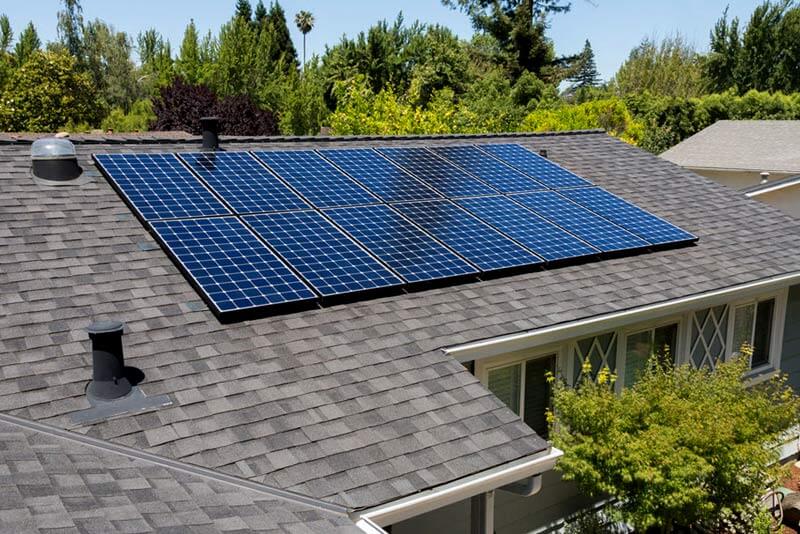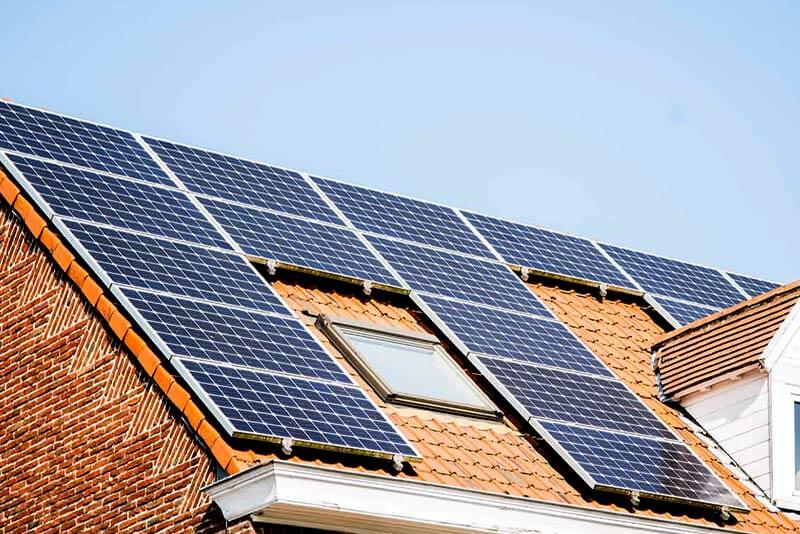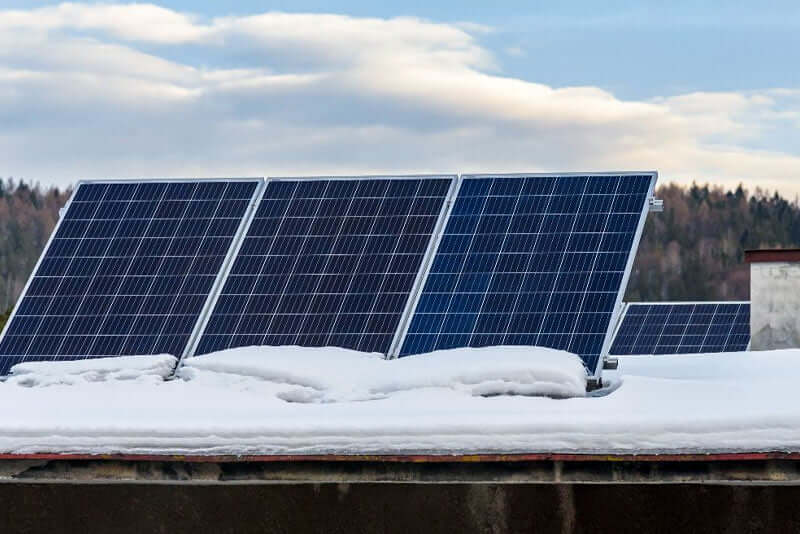Home Do Solar Panels Cool Your Roof?
Do Solar Panels Cool Your Roof?
Solar energy comes with a bunch of advantages, such as decreased dependence on the grid and lower energy bills. But, can solar panels actually reduce the temperature of your roof and home?
Absolutely! According to a study conducted by a team of researchers led by Jan Kleissl at the UC San Diego Jacobs School of Engineering, solar panels reduced the amount of heat reaching your roof by up to 38%. This helped keep the roof covered by solar panels cooler by 5 degrees Fahrenheit than areas directly exposed to sunlight.
Let’s learn more about how solar panels can cool your roof and find out what other benefits you can get from having solar panels installed on your roof.

Table of Contents
ToggleHow do solar panels cool your roof?
The research team at UC San Diego found that solar panels act as a shade that reduces the temperature reaching the room. Ultimately, the house remains cool, reducing the need for air conditioning during hot summer days.
On cold winter days, your solar panel array insulates the room, which reduces the need for heating during the cold season. Consequently, solar photovoltaic panels will reduce your heating and cooling costs in the long run.
Let’s dive deeper into the mechanism through which solar panels cool your room.
1. Energy conversion
We all know solar panels convert solar energy into electricity that powers your home. Typically, residential solar panels achieve an energy efficiency of between 16% to 20%, which is the energy absorbed by each solar panel and converted into electricity.
So, only about 80% to 84% of the sunlight reaches your roof, while the rest of the energy is converted to electricity.
2. Reflectance
Solar panels reflect some of the sunlight that hits their glass and aluminium surface. Even if the solar cells are black or dark blue, they still reflect some of the sunlight that hits them.
3. Emittance
Solar panels usually absorb some of the solar energy that hits their surface. This causes the panels to heat up, and since solar panels are dark blue or black, they get pretty hot, especially on hot sunny days.
Some of the energy gets emitted to the atmosphere/sky, thus cooling the roof to some extent. Unfortunately, when the panels become too hot, some of the heat gets emitted to the roof and could cause the house to heat up.
4. Convection
Conventional solar panel systems are usually mounted on rack systems connected to the roof. The rack holds the panels a few inches from the roof, forming a small air gap that allows for airflow. The airflow can reduce some of the heat from the panels and roof surface, thus making the roof cooler.
The tilted solar panels allow for stronger cooling compared to solar systems in direct contact with the roof. The tilted panels allow air/wind to flow between the gaps, thus removing the extra heat and consequently bringing about a cooling effect on the home.
Does heat enter your home through the roof?
Yes, heat enters your home through your roof through a process known as conduction. Your attic traps some of the heat from the roof, but the heat will still reach the rest of the house, even if you have good insulation.
You may not realise how much heat energy enters your home unless you are on the roof. In fact, on hot summer days, the attic can heat up to 150℃.
You can reduce the amount of heat reaching your home by increasing the insulation in your attic or installing reflective roof membranes.
Solar panels act as roof shades which significantly reduce the heat reaching the roof and attic, consequently cooling your home during hot days.

Will my house be cooler if I install a solar panel system?
Yes, installing solar photovoltaic panels will make your house cooler. Solar panels reduce the amount of heat reaching your roof by up to 38%, or 5 degrees Fahrenheit, but this will depend on your roof thermal properties.
During winter, your solar array could also retain heat in your home. Thus, besides lowering your energy bills, solar panels also decrease your home’s cooling and heating costs. So, solar panels could benefit you in several ways, making them a worthwhile investment.
Why is it important to keep your roof cool?
The primary way through which heat from the sun enters your home is conduction. The heat passes through the solid roofing material and gets conducted into your home.
During the hot summer months, the attic can heat up to 150° or more; no matter how good or effective your insulation is, some of that heat will still leak into your home.
The heat will continue to pass through the attic and walls into your home long after the sun sets. Thus, your home will be hot most of the evening and night.
Since your solar panels do not produce any energy at night, you will have to find other means, such as generators or batteries, to cool your house. These options are not as efficient as solar panels and may lead to increased energy usage.
Keeping your roof cool will help keep your home cool during summer days. This will reduce your power consumption and increase the efficiency of solar panels.
Do solar power systems make your roof last longer?
Yes, solar panels can increase the lifespan of your roof. When appropriately installed, the panels protect the roof from harsh weather, making it last longer.
What other benefits do solar panels have on your roof?
Reflect heat energy
Solar panels cool your roof during hot days by reflecting heat energy. Solar cells are black or dark blue to help them absorb as much sunlight as possible. However, the solar cells still reflect some of the sunlight that hits them.
Also, the PV panels are designed with aluminium frames and glass, which reflect some sunlight away. The roof will, therefore, absorb less heat, and more and more energy is reflected away. This results in a cooler roof and reduced building temperature.
Reduce thermal shock
Some regions with extreme climates can have high temperatures during the day and relatively low temperatures at night. The roof can thus reach significantly high temperatures during the day and cool down quickly when the sun sets.
The huge difference in temperatures causes the roof to experience thermal shock due to sudden expansion and contraction. Over time, the warping and gaps created from the thermal shock will damage the roof.
Solar panels prevent thermal shock by preventing the roof from reaching extremely high or low temperatures. This increases the roof’s lifespan and protects its structural integrity.
Reduce UV radiation
Roofs are designed using different materials, and depending on the type of your roofing material, UV rays can dry out its oils and cause cracking and bleaching. Over time, the degrading effects damage the roof. Solar panels protect the roof from direct UV exposure, thus improving your home’s thermal efficiency while producing clean energy.
Reduce cooling costs
As solar panels reduce the heat reaching your roof, the roof will be cooler, and so will your home. Therefore, the energy needed to run AC units will be greatly reduced, resulting in lower power consumption and, consequently, lower cooling costs.
Reduce exposure to the weather
The roof is the main protection for your home against mother nature. Therefore, it is regularly hit by harsh weather elements like storms, strong winds, sun, snow, hurricanes, hail, etc., while keeping you safe inside the house. Continued exposure to the elements wears down the roof eventually.
Solar panels provide a protective shield for your roof by taking on harsh weather elements. This protects the roof from being directly hit by mother nature, hence increasing the roof’s lifespan. T
Do solar panels cool your attic?
Yes, solar panels can make your attic cooler. The sun heats your roof, and that heat is transferred from the roof into the attic.
Solar panels will absorb most of the sunlight that your roof would have absorbed, creating extra protection between the panels and the roof. Thus, the roof will not heat up much, so the attic will also be cooler.
As we mentioned earlier, solar panels can reduce the heat reaching the roof by up to 38%. This means that the heat reaching the attic from the roof is reduced by 38%.
Do solar panels insulate your roof in winter?
Just like solar panels reduce roof temperatures during the hot summer months, they also insulate your roof in winter.
During the cold winter months, solar PV panels can keep the roof warmer, thus insulating your home. Typically, solar panels retain heat, hence reducing the rate at which your roof loses temperature. This helps keep the house warm during the day and night.

Compare Solar Panel Quotes
Table of Contents
Toggle









